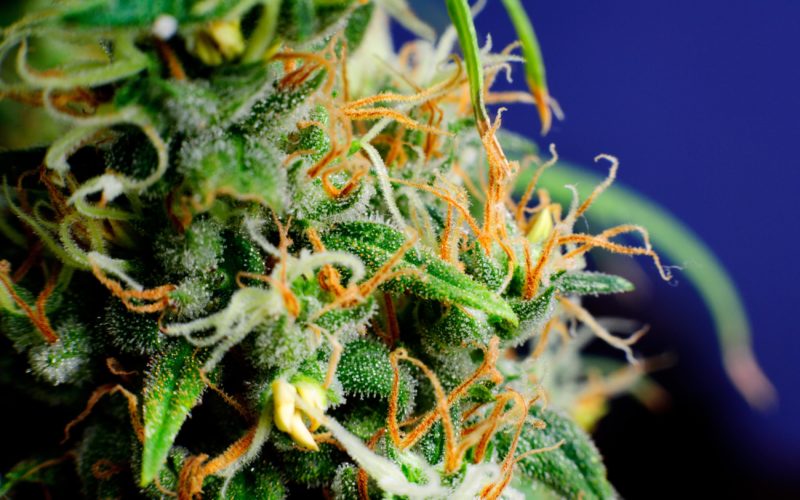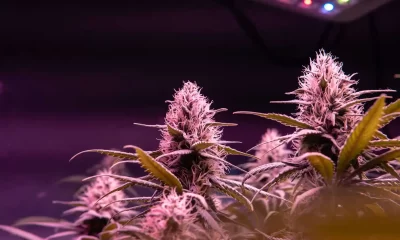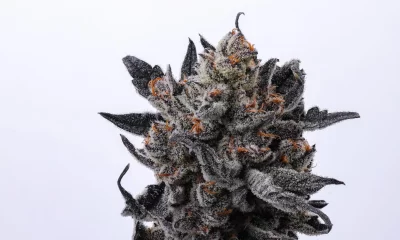Government
Oklahoma Legislation Appears To Fall Short of Ballot

Voters in Oklahoma may have to wait before deciding on the question.
A recreational legalization initiative in Oklahoma may be in jeopardy of not making it to the state ballot this November, despite organizers gathering more than enough signatures to qualify.
The leaders of the “Yes On 820 Campaign” said on Monday that the Oklahoma secretary of state confirmed that the group had submitted more than 117,000 valid signatures –– well above the roughly 95,000 signature threshold for a question to be placed on the state ballot.
But according to the Oklahoma Watch, the group “faces several obstacles in the last part of its journey to the ballot as another challenge period will last at least 10 business days and the state Election Board needs time to print ballots for overseas voters.”
“The certification by the secretary of state now goes to the Oklahoma Supreme Court, which must determine if the signature verification meets the sufficiency requirements. That then starts a 10-day process for anyone to challenge the signature verification,” the Oklahoma Watch reported.
The “Yes on 820 Campaign,” which submitted more than 164,000 signatures to the Oklahoma secretary of state’s office last month, celebrated the validation of the signatures on Monday, but expressed concern that the question will not be in front of the state’s voters come November.
Complicating matters, according to the campaign, is the fact that the Oklahoma secretary of state’s office is using a private vendor in the ballot certification process for the first time.
“The last petition Oklahomans voted on took 17 days to count 313,000 signatures,” Michelle Tilley, the campaign director for “Yes on 820,” said in a statement, as quoted by the Oklahoma Watch. “In contrast, we submitted half that amount and it has taken three times as long. This delay means the election board may not receive the green light to print the ballot in time for voters to vote on it in November.”
The Oklahoma Watch has more on the bureaucratic minutiae: “The governor has the sole authority to call the election for ballot initiatives once the challenge period expires. For all practical purposes, that means the process must be completed by Friday, the state election board told Gov. Kevin Stitt in a letter dated June 22. It said the statutory deadline is Aug. 29 and is in place because the Election Board has to have time to print and mail absentee ballots to overseas voters like those in the military. In a filing with the Supreme Court, the Yes on 820 campaign said the state’s new signature verification system, run by Western Petition Systems, took longer than anyone anticipated.”
State Question 820 would “safely regulate, and tax recreational marijuana for adults 21+ in Oklahoma,” which the campaign asserts “will generate revenue for important priorities for Oklahomans, including schools, health care, and local governments.”
Oklahoma is one of several traditional “red states” where voters could have the chance to end the prohibition on pot this November, with legalization proposals already qualifying for the ballot in Missouri, North Dakota, and South Dakota.
Activists in those states, citing reams of polling, contend that cannabis legalization is veering on a bipartisan consensus in the country, with conservative and liberal voters alike increasingly backing the policy.
After getting word from the secretary of state’s office, the Yes on 820 campaign said Monday that the “overwhelming number of signatures shows that Oklahomans are ready for sensible marijuana laws.”
Tilley and senior campaign adviser Ryan Kiesel sang a similar tune last month, after turning in the signatures to the secretary of state.
“We’re expecting Oklahomans to say yes to this,” Kissel said at the time.
“Oklahomans don’t think that people should be continually punished for something that’s no longer a crime,” he added.
Source: https://hightimes.com/news/oklahoma-legislation-appears-to-fall-short-of-ballot/
Business
New Mexico cannabis operator fined, loses license for alleged BioTrack fraud

New Mexico regulators fined a cannabis operator nearly $300,000 and revoked its license after the company allegedly created fake reports in the state’s traceability software.
The New Mexico Cannabis Control Division (CCD) accused marijuana manufacturer and retailer Golden Roots of 11 violations, according to Albuquerque Business First.
Golden Roots operates the The Cannabis Revolution Dispensary.
The majority of the violations are related to the Albuquerque company’s improper use of BioTrack, which has been New Mexico’s track-and-trace vendor since 2015.
The CCD alleges Golden Roots reported marijuana production only two months after it had received its vertically integrated license, according to Albuquerque Business First.
Because cannabis takes longer than two months to be cultivated, the CCD was suspicious of the report.
After inspecting the company’s premises, the CCD alleged Golden Roots reported cultivation, transportation and sales in BioTrack but wasn’t able to provide officers who inspected the site evidence that the operator was cultivating cannabis.
In April, the CCD revoked Golden Roots’ license and issued a $10,000 fine, according to the news outlet.
The company requested a hearing, which the regulator scheduled for Sept. 1.
At the hearing, the CCD testified that the company’s dried-cannabis weights in BioTrack were suspicious because they didn’t seem to accurately reflect how much weight marijuana loses as it dries.
Company employees also poorly accounted for why they were making adjustments in the system of up to 24 pounds of cannabis, making comments such as “bad” or “mistake” in the software, Albuquerque Business First reported.
Golden Roots was fined $298,972.05 – the amount regulators allege the company made selling products that weren’t properly accounted for in BioTrack.
The CCD has been cracking down on cannabis operators accused of selling products procured from out-of-state or not grown legally:
- Regulators alleged in August that Albuquerque dispensary Sawmill Sweet Leaf sold out-of-state products and didn’t have a license for extraction.
- Paradise Exotics Distro lost its license in July after regulators alleged the company sold products made in California.
Golden Roots was the first alleged rulebreaker in New Mexico to be asked to pay a large fine.
Source: https://mjbizdaily.com/new-mexico-cannabis-operator-fined-loses-license-for-alleged-biotrack-fraud/
Business
Marijuana companies suing US attorney general in federal prohibition challenge

Four marijuana companies, including a multistate operator, have filed a lawsuit against U.S. Attorney General Merrick Garland in which they allege the federal MJ prohibition under the Controlled Substances Act is no longer constitutional.
According to the complaint, filed Thursday in U.S. District Court in Massachusetts, retailer Canna Provisions, Treevit delivery service CEO Gyasi Sellers, cultivator Wiseacre Farm and MSO Verano Holdings Corp. are all harmed by “the federal government’s unconstitutional ban on cultivating, manufacturing, distributing, or possessing intrastate marijuana.”
Verano is headquartered in Chicago but has operations in Massachusetts; the other three operators are based in Massachusetts.
The lawsuit seeks a ruling that the “Controlled Substances Act is unconstitutional as applied to the intrastate cultivation, manufacture, possession, and distribution of marijuana pursuant to state law.”
The companies want the case to go before the U.S. Supreme Court.
They hired prominent law firm Boies Schiller Flexner to represent them.
The New York-based firm’s principal is David Boies, whose former clients include Microsoft, former presidential candidate Al Gore and Elizabeth Holmes’ disgraced startup Theranos.
Similar challenges to the federal Controlled Substances Act (CSA) have failed.
One such challenge led to a landmark Supreme Court decision in 2005.
In Gonzalez vs. Raich, the highest court in the United States ruled in a 6-3 decision that the commerce clause of the U.S. Constitution gave Congress the power to outlaw marijuana federally, even though state laws allow the cultivation and sale of cannabis.
In the 18 years since that ruling, 23 states and the District of Columbia have legalized adult-use marijuana and the federal government has allowed a multibillion-dollar cannabis industry to thrive.
Since both Congress and the U.S. Department of Justice, currently headed by Garland, have declined to intervene in state-licensed marijuana markets, the key facts that led to the Supreme Court’s 2005 ruling “no longer apply,” Boies said in a statement Thursday.
“The Supreme Court has since made clear that the federal government lacks the authority to regulate purely intrastate commerce,” Boies said.
“Moreover, the facts on which those precedents are based are no longer true.”
Verano President Darren Weiss said in a statement the company is “prepared to bring this case all the way to the Supreme Court in order to align federal law with how Congress has acted for years.”
While the Biden administration’s push to reschedule marijuana would help solve marijuana operators’ federal tax woes, neither rescheduling nor modest Congressional reforms such as the SAFER Banking Act “solve the fundamental issue,” Weiss added.
“The application of the CSA to lawful state-run cannabis business is an unconstitutional overreach on state sovereignty that has led to decades of harm, failed businesses, lost jobs, and unsafe working conditions.”
Business
Alabama to make another attempt Dec. 1 to award medical cannabis licenses

Alabama regulators are targeting Dec. 1 to award the first batch of medical cannabis business licenses after the agency’s first two attempts were scrapped because of scoring errors and litigation.
The first licenses will be awarded to individual cultivators, delivery providers, processors, dispensaries and state testing labs, according to the Alabama Medical Cannabis Commission (AMCC).
Then, on Dec. 12, the AMCC will award licenses for vertically integrated operations, a designation set primarily for multistate operators.
Licenses are expected to be handed out 28 days after they have been awarded, so MMJ production could begin in early January, according to the Alabama Daily News.
That means MMJ products could be available for patients around early March, an AMCC spokesperson told the media outlet.
Regulators initially awarded 21 business licenses in June, only to void them after applicants alleged inconsistencies with how the applications were scored.
Then, in August, the state awarded 24 different licenses – 19 went to June recipients – only to reverse themselves again and scratch those licenses after spurned applicants filed lawsuits.
A state judge dismissed a lawsuit filed by Chicago-based MSO Verano Holdings Corp., but another lawsuit is pending.
Source: https://mjbizdaily.com/alabama-plans-to-award-medical-cannabis-licenses-dec-1/
-

 Business2 years ago
Business2 years agoPot Odor Does Not Justify Probable Cause for Vehicle Searches, Minnesota Court Affirms
-

 Business2 years ago
Business2 years agoNew Mexico cannabis operator fined, loses license for alleged BioTrack fraud
-

 Business2 years ago
Business2 years agoAlabama to make another attempt Dec. 1 to award medical cannabis licenses
-

 Business2 years ago
Business2 years agoWashington State Pays Out $9.4 Million in Refunds Relating to Drug Convictions
-

 Business2 years ago
Business2 years agoMarijuana companies suing US attorney general in federal prohibition challenge
-

 Business2 years ago
Business2 years agoLegal Marijuana Handed A Nothing Burger From NY State
-

 Business2 years ago
Business2 years agoCan Cannabis Help Seasonal Depression
-

 Blogs2 years ago
Blogs2 years agoCannabis Art Is Flourishing On Etsy













